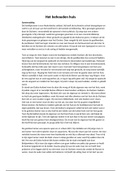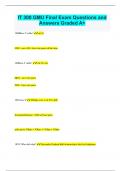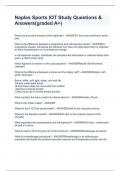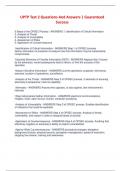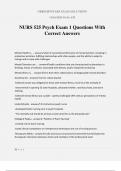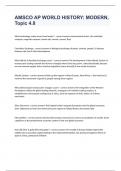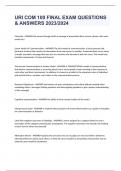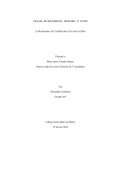WGU D094 Test 1 Review Exam
Questions and Answers Graded A
3 Types of Speech (Vygotsky) - 1. Social Speech - When we talk to others
2. Private Speech - When we talk out loud to ourselves. This occurs between ages 3-7.
A child cannot speak quietly inside his/her head.
3. Silent Inner Speech - When we talk inside our head. No one can hear our private
inner thoughts.
Adaptive - dressing, eating, washing
Adaptive behavior - · daily living skills, such as getting dressed, going to the bathroom,
and feeding one's self;
· communication skills, such as understanding what is said and being able to answer;
· social skills with peers, family members, adults, and others.
Atypical Barrier - Unusual
Authentic or Performance or Performance-based or Alternative Assessments - This is
when we give students time to work on something and expect them to use resources.
There are many types of performance assessments. These types of assessments are
typically more complex than written assessments. Some examples include:
1. Direct Writing Assessment - A research paper
2. Exhibition Assessment - Anything you can display outside your classroom. For
example, paintings, photos, tri-fold boards
3. Demonstration Assessment - Anything you see the student physically do. For
example: A speech, a mock trial, play an instrument, sing, a science experiment, throw
a ball, push-ups, etc.
4. Portfolios - This shows growth over time. We take work from the beginning of a unit,
middle of the unit, and the end of the unit to see student progress. Writing portfolios are
the most commonly used.
Bandura's Theory of Observational and Modeling Learning
3 TYPES OF MODELS - 3 Kinds of Models
1. live - demonstrates behavior in person
2. verbal - explain or describe behavior
3. symbolic - books, movies, tv, video games, etc.
Bandura's Theory of Observational and Modeling Learning
FOR LEARNING TO BE SUCCESSFUL - For Learning (emulation) to be successful:
1. Attention- Focus, pay attention
2. Retention - Remember it
3. Reproduction - Be able to perform it
4. Motivation - Want to copy the model
WGU D094 Test 1 Review Exam Questions and Answers Graded A
,WGU D094 Test 1 Review Exam Questions and Answers Graded A
Bandura's Theory of Observational and Modeling Learning - - Social Learning = Social
Cognitivism
- Modeling and Emulation - "Bobo Doll Experiment" - "Monkey see, Monkey do" - You
watch someone model a behavior and then try and emulate (copy) it.
Behavioral Disorders - Behavioral disorders also known as conduct disorders are one of
the most common forms of disability among children and young adults and is the most
frequently cited reason for referral to mental health services.
Behaviorist Instructional Strategies: - The instructional strategy used by Skinner/operant
conditioning/behaviorism is direct instruction. Think of direct instruction as a lecture. A
teacher lectures at a board and then gives you practice. The most common type of
practice is a worksheet. The teacher than gives you feedback on how you did on your
practice. If you do not learn the concept you will have more instruction and practice.
Direct instruction works best when teaching the basic skills of reading, writing, and
math.
Behaviors Associated with Common Cognitive Development Barriers - - Difficulties with
adaptive behavior or social functioning
- Short attention spans and poor listening skills
- Difficulties remembering instructions
- Difficulties understanding abstract concepts
- Difficulties with planning and time management skills
- Difficulties completing tasks on time
- Need for explicit instruction, repetition, and additional practice
Bloom's Taxonomy
LEVEL 1 - Remembering - Memorizing information. For example: addition facts,
knowing the fifty states, knowing a date in history
Bloom's Taxonomy
LEVEL 2 - Understanding - Restate in own words. Comprehension and paraphrasing.
For example: What happened at the beginning of a story, explain a science concept in
your own words.
Bloom's Taxonomy
LEVEL 3 - Applying - Use it to solve problems never seen before. Answer questions
never heard before. For example: Using your math facts to solve a word problem
Bloom's Taxonomy
LEVEL 4 - Analyzing - Break down a concept into components. Compare and contrast
or pros and cons. For example: Listing the pros and cons to a recycling program.
Bloom's Taxonomy
WGU D094 Test 1 Review Exam Questions and Answers Graded A
, WGU D094 Test 1 Review Exam Questions and Answers Graded A
LEVEL 5 - Evaluating - Look at two ideas and determine if one is more effective than
the other. Making a judgement. For example: What do you believe? Should we have a
recycling program? Why or why not?
Bloom's Taxonomy
LEVEL 6 - Creating - Come up with your own ideas and theories. When you make
something new. For example: a research paper, a speech, etc.
Chromsky's Theory of Language Development - · Linguist Noam Chomsky's work
discusses the biological basis for language and claims that children have innate abilities
to learn language.
· Chomsky terms this innate ability the "language acquisition device."
· He believes children instinctively learn language without any formal instruction.
· Chomsky also believes in the existence of a "universal grammar," which posits that
there are certain grammatical rules all human languages share.
· Noam Chomsky the father of modern linguistics. Universal Grammar (UG) -
1. Babies go through the same stages in development no matter what language they
are learning
2. Infants master language way faster than they should if they're a blank slate.
Classical Conditioning - A neutral stimulus is associated with a natural response. This
one goes with Pavlov's Dogs
Cognition - thinking, reasoning, problem-solving, understanding
Cognitive Constructivism - goes with Piaget - We learn through experience. We learn by
doing, seeing, touching, experiencing things. Real-world experiences and hands-on
learning is important.
Cognitive Development Barriers to Student Learning and Performance: Common
Cognitive Barriers and Behaviors - · Cognitive Challenges are usually intrinsic barriers.
· Common challenges students may experience are learning disabilities, intellectual
disabilities, autism spectrum disorders, traumatic brain injuries (TBIs), and ADHD.
Cognitive Skills are: - - Knowledge: remembering information.
- Comprehension: understanding what has been communicated.
- Application: using general concepts to solve problems.
- Analysis: breaking down information into parts to see relationships between ideas.
- Synthesis: making something new by organizing information into new relationships or
patterns.
- Evaluation: deciding which methods should be used to solve problem
Collaborative Learning - The focus is on the process more than the product.
Students of similar abilities are grouped together. Students work in groups to explore a
significant question.
Instruction is student-led.
WGU D094 Test 1 Review Exam Questions and Answers Graded A


